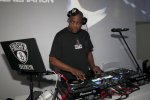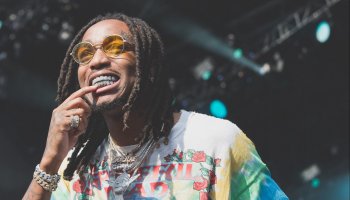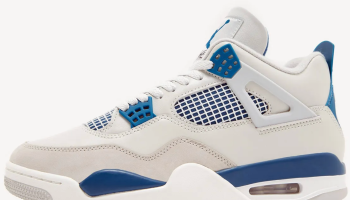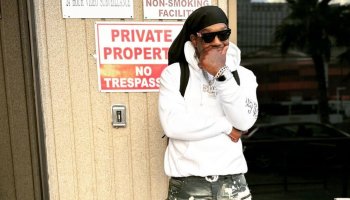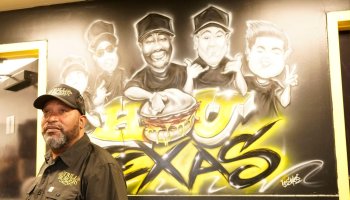DJ Quik, arguably The West Coast’s best producer connects with Kurupt The Kingpin to create a lyrical and sonic explosion…
2009 has been a year full of ups and downs so far. With the passing of Michael Jackson, the world has realized how fragile the music industry really is. There aren’t many people that can enter the fraternity of music and produce works with the ability to stand the test of time. Each year sees the entrance and exit of a new artist; however with every exit we are reminded of those select few artists who have been able to produce hit after hit, leaving them with a career full of longevity. Kurupt and DJ Quik are an example of what happens when an artist creates rather than imitates.
For their uniqueness and ability to create music that not only defined a neighborhood, but an era, Quik and Kurupt continue to be West Coast staples and Hip Hop Legends. With their combined effort Blaqkout in the streets blowing out speakers, Hip-Hop Wired sat down with the west coast kings to speak on their longevity, Death Row records, and the untimely passing of Michael Jackson.
HipHopWired: How did you two first meet and how has your relationship evolved from The Source awards 95’ to today?
Quik: We met at the Row. Suge [Knight] took me up to a session Dr. Dre was havin’ when he was doing The Chronic, and I met him [Kurupt]. He was up there with Daz and Snoopy. I was already out [as an artist], and when I met them I knew I wanted to be a part of what they were doing. I knew they were about to be the biggest thing, and sho’ nuff they were. I always had a good feeling for their whole push, the whole Dogg Pound thing. I’m honored to be working with the Youngsta’; I always knew he was gonna be something special and unique.
HipHopWired: After years as friends and label-mates, what made you two finally decide to do an album together?
Quik: We really did it because we wanted to. Working on the Ego Trippin’ record and just seeing how fun it was again to be in the studio in that capacity, without the headaches and bulls*&t and the big ol’ entourages. It was like the opportunity presented itself you know? And we took it my Ni**a. We just did it.
Kurupt: We had to do it!
HipHopWired: What were y’all trying to accomplish with The Blaqkout?
Quik: We were just doing’ a record my Ni**a. You got two people who been in the business a long time. We didn’t wanna build no hype around it cuz it’s a different kind of record; it’s coming from a different place. So, it was meant to be a more organic thing you know what I’m saying? We’re just trying to get new fans. It’s a whole new push because it’s a different kind of music, and we’re just trying to get people open to it; and its working. We’re building slowly but surely and having fun with it. It’s our record, our record company you know? It’s us! We’re just doing what we wanna do.
HipHopWired: You guys have worked on albums together before, what was difference between other albums and the recording process for Blaqkout?
Kurupt: Quick and easy mayne, quick and easy. We’ve went over so many different obstacles cause I was on the road, so we had to deal with that, but we completed this project in record time. Every time we got into the studio we knocked down 1, 2 hits every time; whenever we had any off time that’s exactly where we would be. It’s amazing to work with somebody that’s professional, as well as, musically above average that brings the best out of you too. So, we fed off each other and just made it happen. All we needed was our vibe; we created our own vibe.
HipHopWired: As far as the album title, Redman and Method man have the “Black Out” series, why did you guys choose to title your album The Blaqkout as well?
Quik: It made sense at the time with what we were doing. [Musically] we were “blacking out” with it. The music was just unique with both of us coming from a different place.
HipHopWired: Quik, you are known to have some of the fullest sounding records in Hip-Hop. What are your techniques in mixing down records?
Quik: Uh, I dunno man, it’s just my ears. That’s the best way to describe it. I think my ears wanna hear something that doesn’t exist, and I go the extra mile to get a sound that’s not like everybody’s. I try to get distinct with it. I’ve been in the studio with some really great engineers over the years and I’ve picked up some of the tricks of the trade that I still use now that still work. I’m just glad that Pro Tools got better you know, to help me facilitate my sound.
HipHopWired: Quik, from your debut, Quik Is The Name all the way up to the Blaqkout album, your production has always evolved into different territories, yet keeping the element of “Funk” within the music. In what way have you gone about reinventing yourself sonically album after album?
Quik: You know, just growing up listening to all our favorite records; you know the records my sisters used to play in the 70’s and 80’s? Them records moved me, and I got used to feeling that kind of feeling you get from having real musicians add to your songs. With beats, this is a kind of dumb down industry right now, with just 808’s, but I still need my guitar player Dave or Robert Bacon to come in and loosen up the track a bit cuz they give it a kind of human element you know? I think that translates.
HipHopWired: Kurupt, aside from working with the usual suspects of major West Coast Producers such as Quik, Dre, Battlecat and your fellow Dogg Pound group mate Daz, you are also known to work with major underground producers such as Pete Rock, Sa-Ra and even the late, great J. Dilla on “Back N Forth” off Fantastic Vol. 2. What experiences made you decide to “jump out the box” and rock over tracks that were atypical of your past work?
Kurupt: Well you know man, I like really being a standard in music from the beginning. You know, Pete Rock from the door, and J. Dilla was young and the new thing crackin’ at my level of what I like in Hip Hop you know? Different and Organic. So I went to Detroit to go do that with them, when Slum [Village] was first fin’ to rock. I always loved new. I just try to stay different from everybody else man and be original. I try and come with words that people wouldn’t say, and put rhymes together differently than everybody else. I just try to keep it afloat and stay within my own parameter of what I consider MC skill. It’s really just me liking the music. If I like the music, I can fly with it. If people got records that I done already heard, and if I start singing they record, 9 times outta’ ten I’m gonna work with that producer. But I got a chosen few, I don’t work with all of em’, it’s just a chosen few.
HipHopWired: What were your experiences with Death Row Records?
Kurupt: Well you know, back in the days with Death Row, it was electrifying. It defined us all today. We had our best and our worst experiences over there, but it groomed us to be the men that we are today, the businessmen we are today. Death Row was a lifeline for us; it was our ups and our downs. It made everything happen for us you know? My career got started from that whole era. It did big for Hip-Hop as well. It opened up so many doors for so many other people even outside of us artist that were on Death Row.
HipHopWired: How do you guys feel about the auctioning of Death Row material and the re-release of some of the classic albums that both of you were involved in?
Kurupt: Well me man, I don’t really have any feelings at all.
Quik: I don’t think they doin’ that for the right reasons. I mean, you know…
HipHopWired: There is said to be over 1,000 unreleased songs and the new owners will be involving the original artists in the re-release process: as far as royalties and input, and adding unreleased songs to the classic albums. Have you all spoken with them and what do think we should expect from the re-releases?
Kurupt: Snoop talked to the people before, so I’m following Snoop’s lead with that right there. Anything else wise, I don’t think anybody is really paying them any mind. Nowadays, there are so many other things. Our minds are set on so many other achievements that we’re gonna be making. We don’t really dwell on it too much.
HipHopWired: You two have spoken about gang violence in L.A. for years and have recently started to fall back on that in the past few years. Do you think your music played any involvement in the escaleted murder rate and gang activity of the 90’s?
Quik: No, my music was because of gang activity. My music was affected by it.
HipHopWired: Nowadays, there’s a “million” cities just like Compton as Bloods and Crips have migrated across the country. How do you feel about the assimilation of gang culture around the U.S. and do you see them as actual members or just folks copying a lifestyle they really don’t know the origins of?
Quik: I think anything that has an air of mystery around it and camaraderie affects everybody. Like the same way I was affected by Break Dancing when I first saw it, I wanted to be a Break Dancer. I think some people feel like becoming a Blood or a Crip will help them in some way, especially as far as protection goes. I come from a gang and that’s kind of why I did it. I just wanted to be a part of something where I wouldn’t be getting bullied or threatened and stuff like that. Now it seems to be more trendy than it is dangerous. Back then it was detrimental to be in a gang, but now it’s almost changed in such a way that Bloods and Crips hang out together. I was just like Wow! When I seen gang bangers in New York… It just shocked the sh&t out of me.
HipHopWired: The news has pushed gang culture to the back in a sense, acting as if it no longer exists, but what’s really good in the streets of L.A?
Quik: It’s real cool. I think people are starting to get the fact that it’s kind of ignorant to have a war here that the U.S. ain’t even help pay for. Like the Iraq war, what’s the use in having a neighborhood war?
HipHopWired: Quik, with the success of this album, will you and MC Eiht ever work together now since the beef has long been squashed?
Quik: We actually did a couple songs that I have the tapes to and I gotta go to the vaults to pull em’ out and see if it’s something that is commercially viable today. Looking at it now and vibing with him now, I realize we were just two people doing the same thing from the same city, enjoying the same benefits of Hip-Hop, as well as, enjoying the same repercussions of the negative that comes with it. It’s all positive and negative that goes with it, but I view him as a man and in that sense, of course I can work with him; and he’s down, it’s just that we gotta find a time to do it, and we gotta kind of do it in secret because I think if the word gets out, that might sabotage the project. But, I dig where he is coming from. His records affected me the same way they affected y’all, like growing up in the hood them some badass records. I was actually a little envious of him because you know he had a record deal first with Orpheus/Capital records. He was a made man already before I got into the game.
HipHopWired: Kurupt, It has been said that Antra signed you to some crazy contract that Suge Knight couldn’t even break which has halted your solo material for years? What’s the status with that and what advice would you give other artists when signing their deals?
Kurupt: I never had my solo materials held. Everything is good with Antra. I’ve been off of Antra for years. We always kept our business to a certain way. All business people at one point in time get to a point where they don’t see eye to eye, but we worked everything out.
HipHopWired: You guys grew up in a crazy time and life could have gone either way. If it wasn’t for music, where would you be?
Kurupt: If it wasn’t for music, I’d be gang bangin’! I’d be all A$$’d out. I’d be done deal, stick a fork in em’.
Quik: Me, I’d probably be trying to get contracts to do construction at certain strip malls, helping build malls.
Quik’s Manager: Quik would be on the Moon or a rocket scientist because he’s a genius! He would be on the Moon and building on Mars.
HipHopWired: With that said, how do you guys feel about the re-beautification taking place around LA and in your old neighborhoods?
Quik: I love that! Growth is always good. I mean, we grow, why shouldn’t our environment and our communities grow? I think it’s wonderful that Compton has become so beautified. I can remember when Compton wasn’t that nice looking. Now I go through there and it’s beautiful.
HipHopWired: Who are some of your favorite artist in music today? Up and coming and established.
Quik: Up and coming, easily I would have to say Jay Rock. I like Nipsey [Hussle] and Glasses [Malone]. I’m watching this guy Problem from Compton, who actually wrote one of the songs on the Blaqkout album. The song “Whatcha Wan Do” was written by Problem. Established, I’ll always be fond of Ice Cube, Snoop, Dr. Dre and Kurupt for that matter. I’m really proud of Eminem for turning it around and writing some lyrics that even have me as an MC saying, “Oh my God! How did you put that Shyte together?” Forgive me for being down like this my man, but I’m trippin’ off this news that everybody else is trippin’ off right now. I’m kind of in shock. Michael Jackson is really like, dead. This is crazy.
HipHopWired: What are your feelings on Michael Jackson’s passing?
Quik: Well Michael Jackson gave us the best Black music, the best music, that anybody could ever receive. His music is like the sound track to my life in every aspect. Aspects of growing up and trying to fight the power; you know the whole oppression, to going through puberty with songs like “All I Do Is Think Of You,” and then onward to making some of the best dance music in the world up next to the Bee-Gee’s and all that. Then to work with Quincy Jones and go in the studio and write an album like Thriller! To write those songs; those songs right now sound timeless. They’ll never date. I’m just in shock. I feel like I lost a close personal family member man.
HipHopWired: Today, L.A. radio seems to be weary of breaking new Cali rappers. How do you feel about the radio scene and what problems have you all seen with your music getting played?
Quik: Being on tour I get to listen to radio in every city and I noticed that everything is kind of based on a playlist now, like whereas it’s not just regional and divided. I think that it’s almost like the radio market is being unified. I don’t know if everybody is coming together to do something different, like the merging of all the radio networks, but I think it seems like more of a blanket musical effect across the whole nation. Like the same eight music records that are hot in LA are hot in Miami or Albuquerque, New Mexico, or Texas. I think it’s a little more difficult. I feel that people have to be endorsed by a record company to get their stuff played now, as opposed to you being able to have a contact with a DJ that will spin your stuff.
HipHopWired: At the end of the day, what do you want your legacy to be?
Kurupt: At the end of the day, I just want the world to enjoy my music man. Me and Quik gonna keep coming out with new projects together and by ourselves, and I just want people to enjoy the music. Hopefully they have through my career. A lot of people say they gonna retire, but I’m gonna be rappin’ till I’m a hundred years old man. I’ll always have something to talk about. It’s what I love.
Quik: I personally don’t wanna see the end of the day.
HipHopWired: Other than your current tour what is next for you guys?
Quik: We’ll be back in L.A. on Tuesday. I gotta get back in the studio to work on my new album. I think I’m gonna call it the Lone Wolf Prophet. I’m just seeing a lot of things come to fruition and I realize that people like Kurupt and myself gotta be weary of what we say because, my whole life I have been speaking things into existence. I’mma be careful what I wish for because I might get it.
